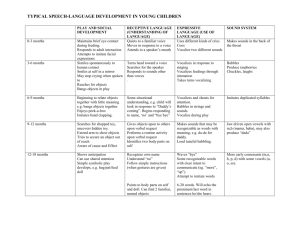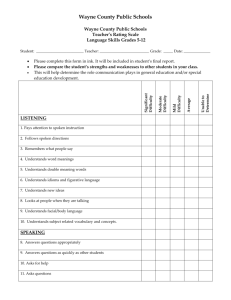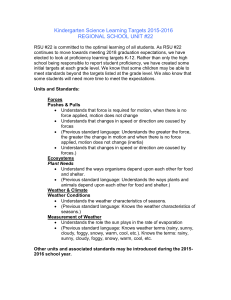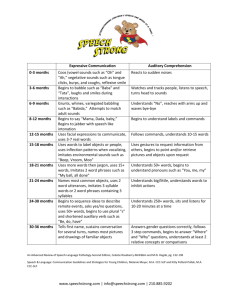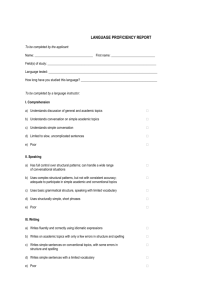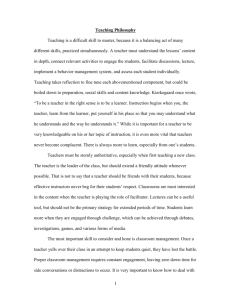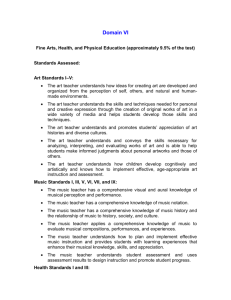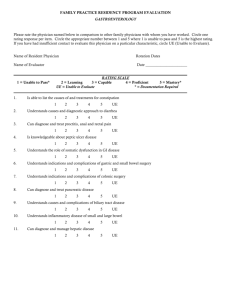Stages of speech and language development chart
advertisement
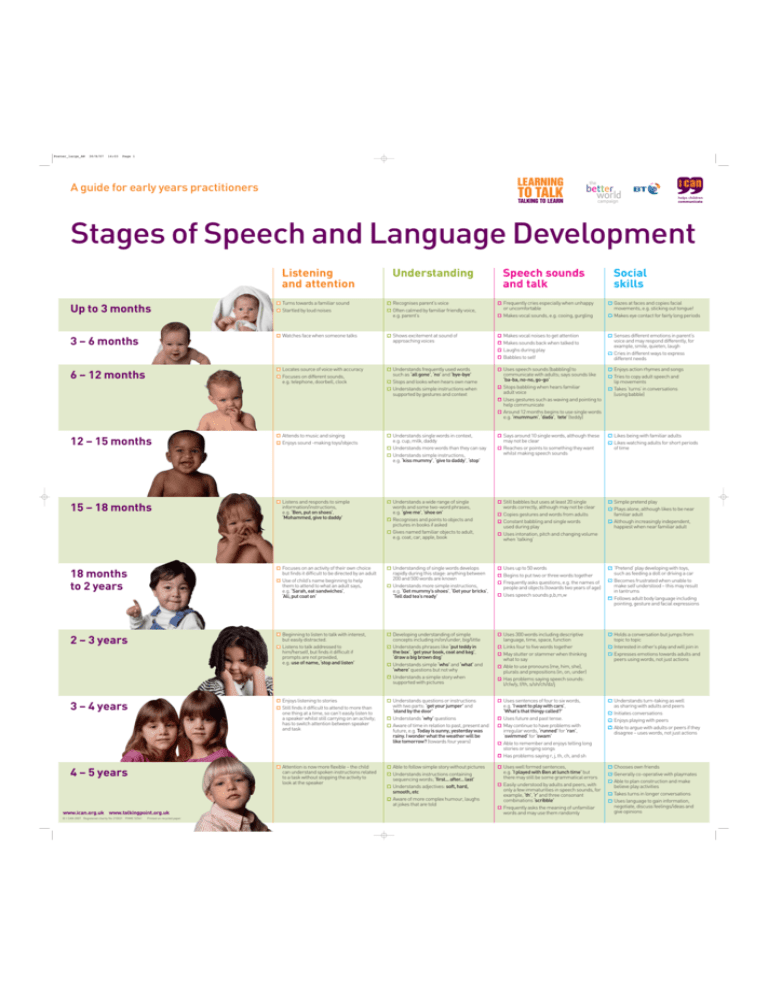
Poster_large_AW 30/8/07 14:03 Page 1 LEARNING A guide for early years practitioners TO TALK TALKING TO LEARN Stages of Speech and Language Development Listening and attention Understanding Speech sounds and talk Social skills Turns towards a familiar sound Startled by loud noises Recognises parent’s voice Often calmed by familiar friendly voice, e.g. parent’s Frequently cries especially when unhappy or uncomfortable Makes vocal sounds, e.g. cooing, gurgling Gazes at faces and copies facial movements, e.g. sticking out tongue! Makes eye contact for fairly long periods Watches face when someone talks Shows excitement at sound of approaching voices Makes vocal noises to get attention Makes sounds back when talked to Laughs during play Babbles to self Senses different emotions in parent’s voice and may respond differently, for example, smile, quieten, laugh Cries in different ways to express different needs 6 – 12 months Locates source of voice with accuracy Focuses on different sounds, e.g. telephone, doorbell, clock Understands frequently used words such as ‘all gone’, ‘no’ and ‘bye-bye’ Stops and looks when hears own name Understands simple instructions when supported by gestures and context Uses speech sounds (babbling) to communicate with adults; says sounds like ‘ba-ba, no-no, go-go’ Stops babbling when hears familiar adult voice Uses gestures such as waving and pointing to help communicate Around 12 months begins to use single words e.g. ‘mummum’, ‘dada’, ‘tete’ (teddy) Enjoys action rhymes and songs Tries to copy adult speech and lip movements Takes ‘turns’ in conversations (using babble) 12 – 15 months Attends to music and singing Enjoys sound -making toys/objects Understands single words in context, e.g. cup, milk, daddy Understands more words than they can say Understands simple instructions, e.g. ‘kiss mummy’, ‘give to daddy’, ‘stop’ Says around 10 single words, although these may not be clear Reaches or points to something they want whilst making speech sounds Likes being with familiar adults Likes watching adults for short periods of time 15 – 18 months Listens and responds to simple information/instructions, e.g. ‘Ben, put on shoes’, ‘Mohammed, give to daddy’ Understands a wide range of single words and some two-word phrases, e.g. ‘give me’, ‘shoe on’ Recognises and points to objects and pictures in books if asked Gives named familiar objects to adult, e.g. coat, car, apple, book Still babbles but uses at least 20 single words correctly, although may not be clear Copies gestures and words from adults Constant babbling and single words used during play Uses intonation, pitch and changing volume when ‘talking’ Simple pretend play Plays alone, although likes to be near familiar adult Although increasingly independent, happiest when near familiar adult 18 months to 2 years Focuses on an activity of their own choice but finds it difficult to be directed by an adult Use of child’s name beginning to help them to attend to what an adult says, e.g. ‘Sarah, eat sandwiches’, ‘Ali, put coat on’ Understanding of single words develops rapidly during this stage: anything between 200 and 500 words are known Understands more simple instructions, e.g. ‘Get mummy’s shoes’, ‘Get your bricks’, ‘Tell dad tea’s ready’ Uses up to 50 words Begins to put two or three words together Frequently asks questions, e.g. the names of people and objects (towards two years of age) Uses speech sounds p,b,m,w ‘Pretend’ play developing with toys, such as feeding a doll or driving a car Becomes frustrated when unable to make self understood – this may result in tantrums Follows adult body language including pointing, gesture and facial expressions Beginning to listen to talk with interest, but easily distracted. Listens to talk addressed to him/herself, but finds it difficult if prompts are not provided, e.g. use of name, ‘stop and listen’ Developing understanding of simple concepts including in/on/under, big/little Understands phrases like ‘put teddy in the box’, ‘get your book, coat and bag’, ‘draw a big brown dog’ Understands simple ‘who’ and ‘what’ and ‘where’ questions but not why Understands a simple story when supported with pictures Uses 300 words including descriptive language, time, space, function Links four to five words together May stutter or stammer when thinking what to say Able to use pronouns (me, him, she), plurals and prepositions (in, on, under) Has problems saying speech sounds: l/r/w/y, f/th, s/sh/ch/dz/j Holds a conversation but jumps from topic to topic Interested in other’s play and will join in Expresses emotions towards adults and peers using words, not just actions Enjoys listening to stories Still finds it difficult to attend to more than one thing at a time, so can’t easily listen to a speaker whilst still carrying on an activity; has to switch attention between speaker and task Understands questions or instructions with two parts: ‘get your jumper’ and ‘stand by the door’ Understands ‘why’ questions Aware of time in relation to past, present and future, e.g. Today is sunny, yesterday was rainy. I wonder what the weather will be like tomorrow? (towards four years) Uses sentences of four to six words, e.g. ’I want to play with cars’, ‘What’s that thingy called?’ Uses future and past tense. May continue to have problems with irregular words, ‘runned’ for ’ran’, ‘swimmed’ for ‘swam’ Able to remember and enjoys telling long stories or singing songs Has problems saying r, j, th, ch, and sh Understands turn-taking as well as sharing with adults and peers Initiates conversations Enjoys playing with peers Able to argue with adults or peers if they disagree – uses words, not just actions Attention is now more flexible – the child can understand spoken instructions related to a task without stopping the activity to look at the speaker Able to follow simple story without pictures Understands instructions containing sequencing words; ‘first... after... last’ Understands adjectives: soft, hard, smooth, etc Aware of more complex humour, laughs at jokes that are told Uses well formed sentences, e.g. ‘I played with Ben at lunch time’ but there may still be some grammatical errors Easily understood by adults and peers, with only a few immaturities in speech sounds, for example, ‘th’, ‘r’ and three consonant combinations ‘scribble’ Frequently asks the meaning of unfamiliar words and may use them randomly Chooses own friends Generally co-operative with playmates Able to plan construction and make believe play activities Takes turns in longer conversations Uses language to gain information, negotiate, discuss feelings/ideas and give opinions Up to 3 months 3 – 6 months 2 – 3 years 3 – 4 years 4 – 5 years www.ican.org.uk www.talkingpoint.org.uk © I CAN 2007 Registered charity No 210031 PHME 52561 Printed on recycled paper.
